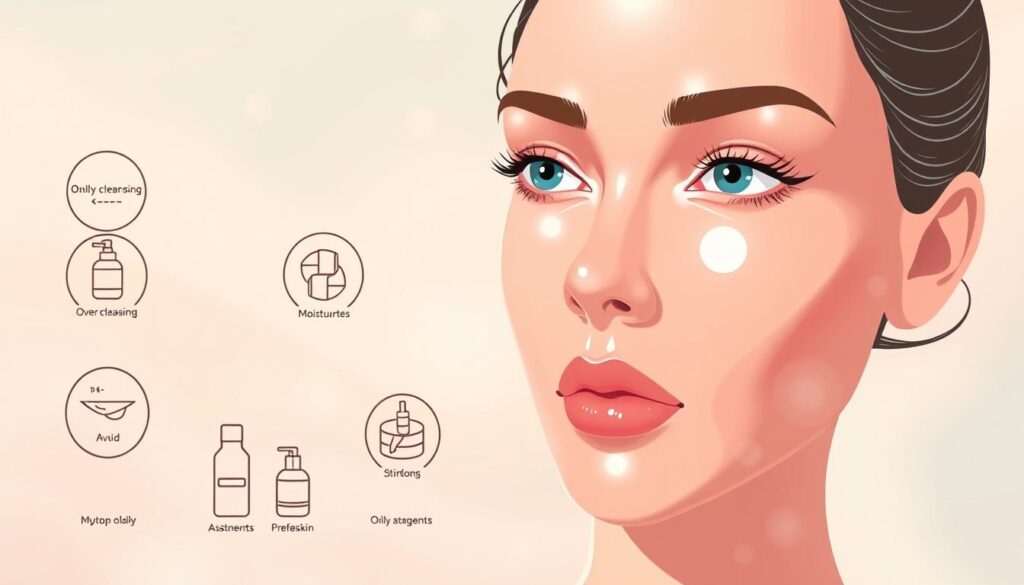Do you think oily skin means you’re not clean? Many of us deal with oily skin, but we often get the wrong information about it.
Learning the truth about oily skin can help you take better care of your skin. We’ll look at common myths about oily skin and share expert tips on how to care for it.
By clearing up these myths, we want to give you the knowledge to make smart skincare choices. Let’s begin by understanding what oily skin is and why it happens.
For more such content VISIT: https://besttopt10.com/
Key Takeaways
- Common misconceptions about oily skin
- Causes of oily skin
- Effective skincare routines for oily skin
- Expert tips for managing excess oil
- Debunking myths surrounding oily skin
Understanding Oily Skin and Its Causes
Managing oily skin starts with knowing what causes it. Oily skin has too much oil, making it shiny and possibly clogged. Genetics, hormones, and the environment all play a part.
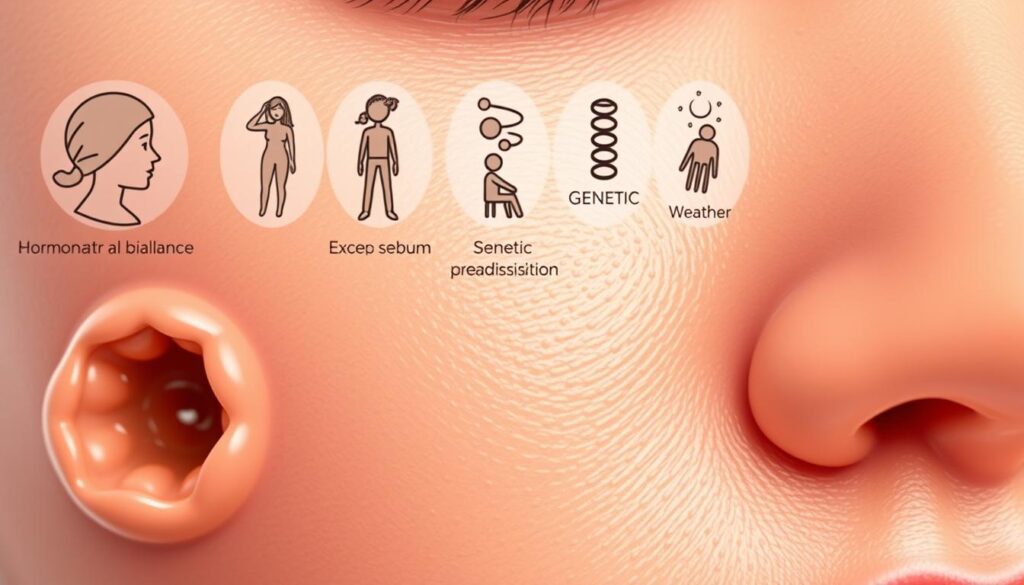
What Causes Oily Skin?
Oily skin happens when your body makes too much sebum. Sebum is good for keeping skin healthy, but too much is bad. Many things can make you produce more sebum.
- Genetics: Your genes help decide your skin type.
- Hormonal Changes: Hormones can change a lot, affecting oil production.
- Environmental Factors: The environment can also affect how oily your skin is.
The Role of Genetics in Skin Type
Genetics are key in determining your skin type, including how oily it is. If your family has oily skin, you might too. Knowing this helps you choose the right skincare.
Hormonal Influences on Oil Production
Hormones can really change how much oil your skin makes. For example, more androgens during puberty means more sebum. Hormonal shifts during pregnancy or menopause can also make skin oilier.
Understanding these factors helps you manage oily skin better. Knowing about genetics and hormones lets you pick skincare that fits your skin’s needs. This can help with oily skin problems.
Common Myths About Oily Skin
Oily skin is often misunderstood, leading to many myths. These myths can confuse people trying to care for their skin. They can even make oily skin worse instead of better.
Moisturizer Myth
Many think oily skin doesn’t need moisturizer. But, moisturizer is key for all skin types, including oily skin. It helps keep the skin hydrated and balanced, without clogging pores.
When picking a moisturizer for oily skin, choose lightweight, oil-free ones. Look for products labeled “non-comedogenic” or “oil-free” to avoid clogging pores.
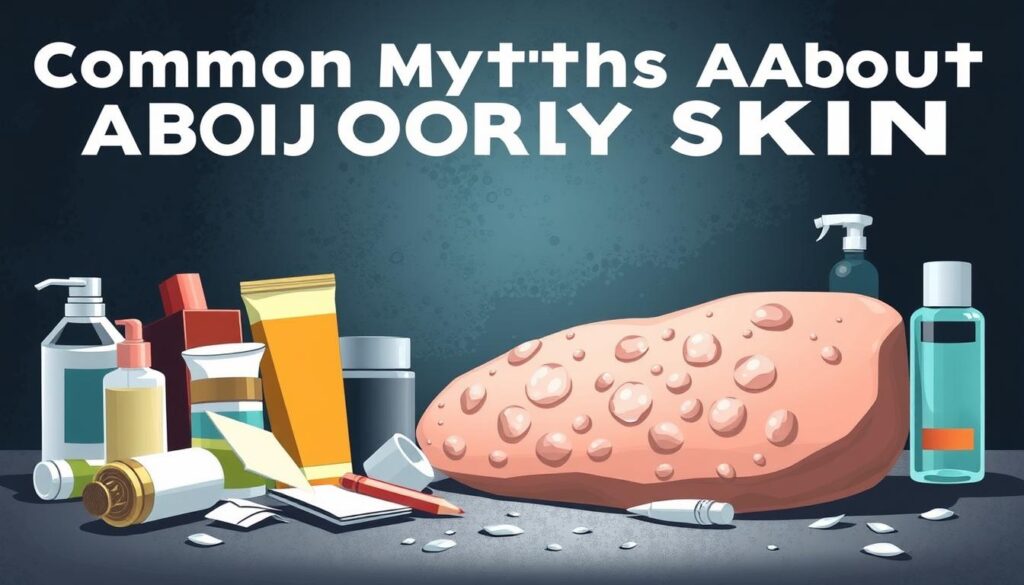
Hygiene Misconception
Another myth is that oily skin means poor hygiene. This is not true. Oily skin can come from genetics, hormonal imbalances, and the environment. Good hygiene is important, but it’s not the main cause of oily skin.
Oily Skin and Age
Many believe oily skin is only a teen issue. But, oily skin can last into adulthood. Genetics, stress, and some medications can cause it at any age.
By clearing up these myths, we can better care for our skin. A well-informed skincare routine can help manage oily skin. This leads to healthier, more balanced skin over time.
The Effects of Oily Skin on Overall Health
Oily skin is not just about looks. It can also affect your health in big ways. If not managed, oily skin can lead to skin problems and impact your well-being.
Skin Conditions Associated with Oily Skin
Oily skin can increase the risk of certain skin issues. Some of these include:
- Acne: Too much oil can block pores and cause acne.
- Seborrheic dermatitis: This is a red, itchy rash, often on the scalp.
- Keratosis pilaris: It causes rough skin patches due to clogged pores.
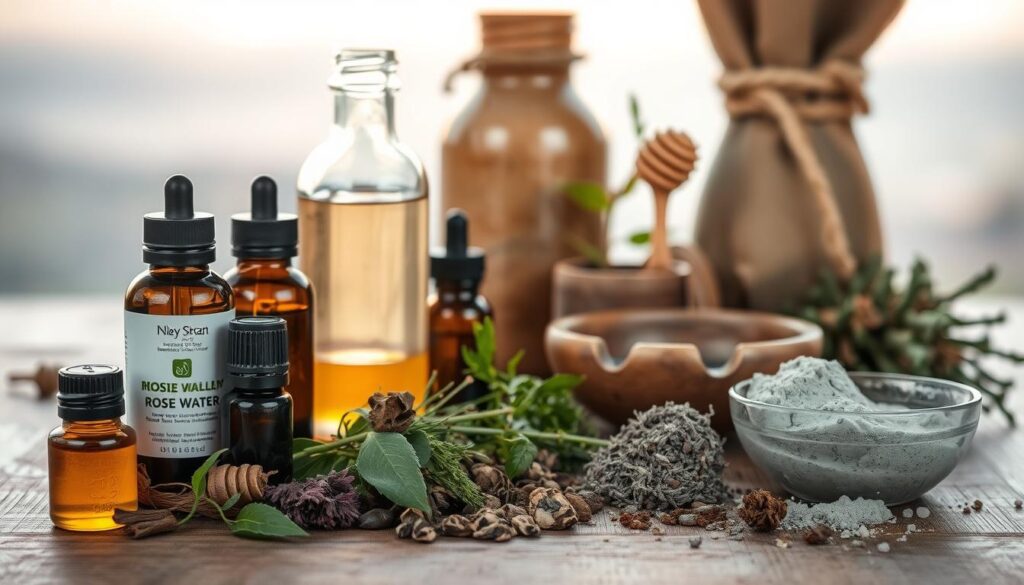
Daily Care for Oily Skin Types
Managing oily skin needs a daily skincare routine. Here are some tips:
- Clean your face twice a day with a gentle cleanser to remove excess oil and dirt.
- Choose oil-free or lightweight products to avoid clogging pores.
- Apply a toner to control oil and reduce pore appearance.
The Importance of Sunscreen for Oily Skin
Sunscreen is key, even for oily skin. Look for oil-free or lightweight sunscreens. They protect your skin from UV damage, preventing early aging and skin cancer. Some good sunscreens for oily skin are:
- Neutrogena Sheer Zinc Dry-Touch Sunscreen
- La Roche-Posay Anthelios Melt-In Sunscreen Milk
- EltaMD UV Clear Broad-Spectrum SPF 46
By following these tips and choosing the right products, you can manage oily skin. This helps keep your skin healthy and balanced. Remember, a consistent skincare routine and the right products are key.
Debunking Skincare Products Myths
The world of skincare is full of myths, mainly about oily skin. It’s key to know what’s real and what’s not as we deal with oily skin.
Drying Out the Skin
Many think all oily skin products dry out the skin. But, today’s products aim to control oil and keep moisture. Look for light, oil-free moisturizers that won’t block pores.
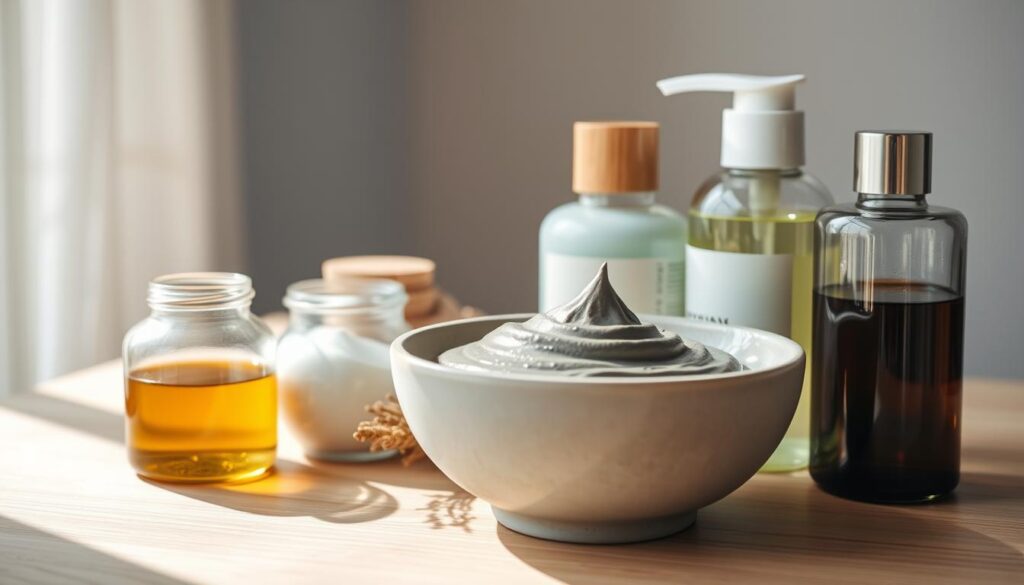
Exfoliation Misconceptions
Some believe you should exfoliate every day. But, too much can irritate and even make oil worse. Stick to gentle exfoliants one to three times a week, based on your skin.
Ingredients to Avoid
Knowing what’s in your products is key for oily skin. Some ingredients, like comedogenic ones, can clog pores and make oily skin worse. Watch out for:
- Mineral oil, which can clog pores and lead to acne.
- Petrolatum, a comedogenic ingredient that can worsen oily skin.
- Isopropyl myristate, known to cause comedones and acne.
By knowing these myths and facts, you can choose better skincare. This leads to better oily skin management.
Effective Skincare Tips for Oily Skin
Caring for oily skin means using the right products and sticking to a routine. Knowing what causes oily skin and clearing up myths is key. This helps you start on the path to healthier, balanced skin.
Best Practices for Oily Skin Care
Choosing gentle, oil-controlling products is essential. Opt for oil-free moisturizers and cleansers made for oily skin. Keeping up with a skincare routine helps control oil and shrink pores.
Recommended Products for Oily Skin
Many products are made for oily skin. Look for ones with ingredients that control oil and fight acne. By picking the right products and sticking to a routine, you can manage oily skin well. This improves your skin health and clears up common myths.

